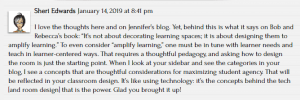More on spaces
I’ve been reflecting on my most recent post and the one before, which discuss work spaces, including classrooms. As I write this, I am in the midst of preparing our home to be sold. To make it more appealing, we have recently updated bathrooms and the laundry room. We are painting the walls to neutral colors. Not my preference, but what buyers want to see.
As I have made decisions on various elements, I have been apathetic. “Is the granite beige enough? It will do.” “Is it a faucet? Does water run through it? Sold.” The updated rooms look fresh and current, so are a success. At the same time, I have no particular attachment to them, as I expect to be vacating this home in a few months. And, since I didn’t improve the spaces for my own enjoyment, the changes don’t reflect “me.”
In contrast, my experience when we remodeled our kitchen several years was joyous. It was thrilling to choose countertops, cabinets, appliances, paint colors… I still love my kitchen.
This small personal example reinforces the various points Tim Harford makes in his book Messy: The Power of Disorder to Transform Our Lives. People want control of their work spaces.
My colleague Sheri Edwards zoomed out further on this discussion. As she puts it, we need a “thoughtful pedagogy” that focuses on learner-centered design. Classroom design is just one part of the picture.

Thanks, Sheri! I agree with you, so often education reform is observed through the (IMHO) wrong lens(es). There is so much emphasis on things like “better data” (gag), or “better tech.” There is a lot of investigating symptoms, and a distinct unwillingness to look at the root of the problem.
Perfect examples. Context and pedagogy matter! Is it one reason why education seems stuck: conversations on those two ideas seldom happen, and if they do, are they productive towards improving learning? Your posts always strike me as trying to influence those things, to help others think things through and move forward. Thank you. ~ Sheri